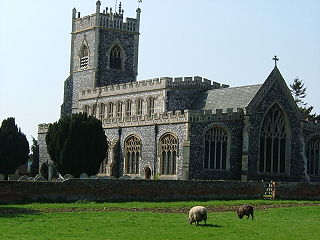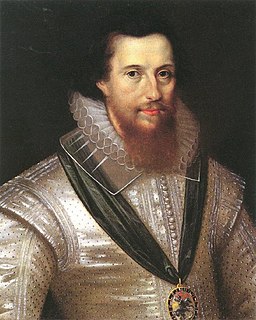Related Research Articles

Waiting for Godot is a play by Samuel Beckett in which two characters, Vladimir (Didi) and Estragon (Gogo), engage in a variety of discussions and encounters while awaiting the titular Godot, who never arrives. Waiting for Godot is Beckett's translation of his own original French-language play, En attendant Godot, and is subtitled "a tragicomedy in two acts". The original French text was composed between 9 October 1948 and 29 January 1949. The premiere, directed by Roger Blin, was on 5 January 1953 at the Théâtre de Babylone, Paris. The English-language version premiered in London in 1955. In a poll conducted by the British Royal National Theatre in 1998/99, it was voted the "most significant English-language play of the 20th century".

The Battle of Edgehill was a pitched battle of the First English Civil War. It was fought near Edge Hill and Kineton in southern Warwickshire on Sunday, 23 October 1642.

Richard Turpin was an English highwayman whose exploits were romanticised following his execution in York for horse theft. Turpin may have followed his father's trade as a butcher early in his life but, by the early 1730s, he had joined a gang of deer thieves and, later, became a poacher, burglar, horse thief and killer. He is also known for a fictional 200-mile (320 km) overnight ride from London to York on his horse Black Bess, a story that was made famous by the Victorian novelist William Harrison Ainsworth almost 100 years after Turpin's death.

Charles Blount, 1st Earl of Devonshire, KG was an English nobleman and soldier who served as Lord Deputy of Ireland under Queen Elizabeth I, and later as Lord Lieutenant of Ireland under King James I.
Captain Samuel Bellamy, later known as "Black Sam" Bellamy, was an English sailor, turned pirate, who operated in the early 18th century. He is best known as the wealthiest pirate in recorded history, and one of the faces of the Golden Age of Piracy. Though his known career as a pirate captain lasted little more than a year, he and his crew captured at least 53 ships. Called "Black Sam" in Cape Cod folklore because he eschewed the fashionable powdered wig in favor of tying back his long black hair with a simple band, Bellamy became known for his mercy and generosity toward those he captured on his raids. This reputation earned him another nickname, the "Prince of Pirates". He likened himself to Robin Hood, with his crew calling themselves "Robin Hood's Men".
The London SS is a British rock group founded in March 1975 by drummer Geir Wade, bassist John Brown, guitarist Mick Jones, and guitarist Eunan Brady. They later became associated with the then new punk rock scene when the Sex Pistols broke in early 1976. In 2012 Brady put together a new lineup, featuring himself along with Jimi McDonald, Taj Sagoo, Michael Kane, and Andi Emm.

Quintus Curtius Rufus was a Roman historian, probably of the 1st century, author of his only known and only surviving work, Historiae Alexandri Magni, "Histories of Alexander the Great", or more fully Historiarum Alexandri Magni Macedonis Libri Qui Supersunt, "All the Books That Survive of the Histories of Alexander the Great of Macedon." Much of it is missing. Apart from his name on the manuscripts, nothing else certain is known of him. This fact alone has led philologists to believe that he had another historical identity, to which, due to the accidents of time, the link has been broken. A few theories exist. They are treated with varying degrees of credibility by various authors. Meanwhile, the identity of Quintus Curtius Rufus, historian, is maintained separately.
The Lord Chamberlain's Men was a company of actors, or a "playing company", for which Shakespeare wrote during most of his career. Richard Burbage played most of the lead roles, including Hamlet, Othello, King Lear, and Macbeth. Formed at the end of a period of flux in the theatrical world of London, it had become, by 1603, one of the two leading companies of the city and was subsequently patronized by James I.

The Flying Dutchman is a legendary ghost ship, allegedly never able to make port, but doomed to sail the seven seas forever. The myth is likely to have originated from the 17th-century Golden Age of the Dutch East India Company (VOC) and of Dutch maritime power. The oldest known extant version of the legend dates from the late 18th century. According to the legend, if hailed by another ship, the crew of the Flying Dutchman might try to send messages to land, or to people long dead. Reported sightings in the 19th and 20th centuries claimed that the ship glowed with a ghostly light. In ocean lore, the sight of this phantom ship functions as a portent of doom. It was commonly believed that the Flying Dutchman was a Fluyt.

Essex was an American whaling ship from Nantucket, Massachusetts, which was launched in 1799. In 1820, while at sea in the southern Pacific Ocean under the command of Captain George Pollard Jr., the ship was attacked and sunk by a sperm whale. Thousands of miles from the coast of South America with little food and water, the 20-man crew was forced to make for land in the ship's surviving whaleboats.

Stratford St. Mary is a village in Suffolk, England in the heart of 'Constable Country'. John Constable painted a number of paintings in and around Stratford.

The Mermaid Tavern was a tavern on Cheapside in London during the Elizabethan era, located east of St. Paul's Cathedral on the corner of Friday Street and Bread Street. It was the site of the so-called "Fraternity of Sireniacal Gentlemen", a drinking club that met on the first Friday of every month that included some of the Elizabethan era's leading literary figures, among them Ben Jonson, John Donne, John Fletcher and Francis Beaumont, Thomas Coryat, John Selden, Robert Bruce Cotton, Richard Carew, Richard Martin, and William Strachey. A popular tradition has grown up that the group included William Shakespeare, although most scholars think that was improbable.

Master Christopher Jones Jr. was the captain of the 1620 voyage of the Pilgrim ship Mayflower.

Essex in Ireland refers to the military campaign pursued in Ireland in 1599 by Robert Devereux, 2nd Earl of Essex, during the Nine Years War.

"Voyage of the Damned" is an episode of the British science fiction television programme Doctor Who. First broadcast on BBC One on 25 December 2007, it is the third Doctor Who Christmas special since the show's revival in 2005. The episode was written by Russell T Davies and directed by James Strong.

Brentwood is a town in the Borough of Brentwood, in the county of Essex in the East of England. It is in the London commuter belt, situated 20 miles (30 km) east-north-east of Charing Cross and close by the M25 motorway. In 2017, the population of the town was estimated to be 54,885.

Thomas Gerard, 1st Baron Gerard was a Staffordshire and Lancashire landowner and politician, a member of six English parliaments for three different constituencies. Although a prominent member of the Essex faction in the reign of Elizabeth I, he avoided involvement in the Essex Rebellion and received greater honours, including a peerage, in the reign of James I.
Essex Street Chapel, also known as Essex Church, is a Unitarian place of worship in London. It was the first church in England set up with this doctrine, and was established when Dissenters still faced legal threat. As the birthplace of British Unitarianism, Essex Street has particularly been associated with social reformers and theologians. The congregation moved west in the 19th century, allowing the building to be turned into the headquarters for the British and Foreign Unitarian Association and the Sunday School Association. These evolved into the General Assembly of Unitarian and Free Christian Churches, the umbrella organisation for British Unitarianism, which is still based on the same site, in an office building called Essex Hall. This article deals with the buildings, the history, and the current church, based in Kensington.

Sir Thomas Smythe was an English merchant, politician and colonial administrator. He was the first governor of the East India Company and treasurer of the Virginia Company from 1609 to 1620 until enveloped by scandal.
Thomas Grey, 15th Baron Grey de Wilton was an English aristocrat, soldier and conspirator. He was convicted of involvement in the Bye Plot against James I of England.